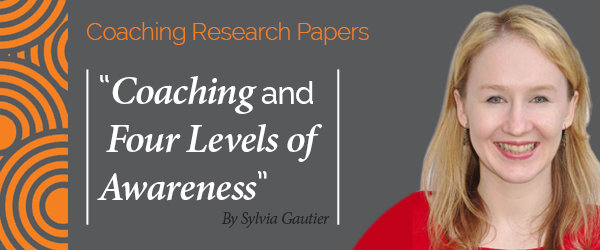
(Life and Wellness Coach, UK)
Introduction
The objective of a coach is to help his/her clients achieve their full potential. This paper aims at discussing how coaches can guide clients towards a proactive life. It explains how this can be achieved by increasing the client awareness according to four levels:
- self-awareness,
- goals awareness,
- mapping awareness a
- nd environmental awareness.
Finally, a real case study presents how the theories presented in this paper can be applied in a real coaching environment.
Definition of proactive living
The word proactive appeared in the 30s before being vulgarized after the release of the book Man’s search for meaning (Frankl, 1946). Proactive is formed with the prefix pro – ‘before’ in Greek – and the root active. Etymologically, it means ‘active before’. This relates to the importance of anticipating when adopting a proactive behaviour, which differentiates being proactive from being reactive. It also refers to the importance of taking a leadership role when dealing with a situation. Those two ideas are combined in the modern definition of proactive which is ‘anticipating and taking charge of situations’ (Wikipedia, 2012).
Proactive behaviours can emerge in two kinds of situations (Bindl, In Press):
- On the one hand, people can be proactive when sorting out issues. In that case, it is important to deal with those issues as soon as possible, when they can be easily sorted. Indeed, issues often have a potential to grow far beyond expectations. In such a case, they become real problems that are much harder to manage.
- On the other hand, proactivity can occur when seizing opportunities. In such a case, proactive people will be aware of the opportunities and how they can get them closer to their goals.
- The two situations can be combined into one, when a proactive person tries to turn an issue into an opportunity. It could be illustrated with the example of one of my colleagues. When people were being made redundant at her job, she decided to volunteer for the redundancy and to use that as an opportunity to make a new start. She had always dreamt of living in Australia, so she made the big move shortly after she had handed her resignation.
Proactive behaviours are often compared to reactive ones because both aim at bringing a change (Bindl, In Press). However, the main difference between the two behaviours is the attitude towards the change:
- A reactive behaviour is triggered by an event that necessitates a change. The actor is not in control and the change is often motivated by external circumstances. The objective of the change is only to manage the problem in order to get back to an acceptable situation.
- A proactive behaviour can be triggered by internal or external events. In any cases, the actor decides to take control of the situation and finds some inner motivation to lead the change. The objective of the change is to make the most of the current situation.
The difference between reactive and proactive behaviours lies in the importance given to preparing the change. While the reactive person focuses on the actions, the proactive person builds up some in-depth awareness of the current situation in order to fully benefit from future actions (Ehow, 2012). The next section of this paper describes the elements of the proactive person’s awareness.